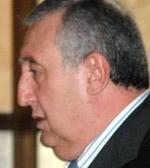After announcing his resignation, National Assembly chairman Arthur Baghdasaryan immediately announced that the “Rule of Law” party was going to become oppositional. What do Armenian oppositionists have to say about this and are they ready to work with their colleague who declared himself oppositionist in one day? It seems as though the oppositionists’ opinions on this are split into two sides. Some say that there is no more room for oppositionists and Arthur Baghdasaryan can’t become part of the opposition, while others believe that A. Baghdasaryan must “ask forgiveness for his crimes committed during his days in the government”, especially the events of April 12 and 13, 2004. After that, they will accept him as an oppositionist. Some are ready to work with “Rule of Law” under the condition that “Rule of Law” shows that it really is oppositionist through its actions.
Leader of the “Armenian Liberal Progressive Party” (ALPP) Hovhannes Hovhannisyan believes that the opposition is not a “closed room” to open its doors to everyone.
“The opposition is a big concept. If a political party declares that it’s going to turn oppositional, it has to show the people that it really wants to become oppositional by actions and principles,” said H. Hovhannisyan during an interview with “168 Hours”. He added that only time and the process will show whether or not “Rule of Law” is ready to become part of the opposition and help solve all the current issues facing the country. According to leader of the ALPP, we must consider Arthur Baghdasaryan’s announcement about “Rule of Law” leaving the coalition and Baghdasaryan’s resignation from chairman of the National Assembly as an important step in politics in the past 15 years after Armenia’s independence.
“We must admit that this was a serious step in bringing back the political culture of Armenia. The political figure may resign from his position due to disagreements. This should not only be the case for Arthur Baghdasarayan, but also the prime minister, the president, the ministers and those who shouldn’t simply “go along” with everything and “drag” the people along,” says H. Hovhannisyan.
Hovhannisyan says that the last time something like this happened was when Vazgen Manukyan refused to be appointed Minister of Defense of Armenia based on political reasons. Is the ALPP ready to work with the already oppositionist “Rule of Law” and is it possible to form an oppositionist union with a clear ideology, having “Rule of Law” be part of that union-especially since recently Arthur Baghdasaryan has been talking about strengthening ties with NATO and the need to move towards Europe, just like the ALPP plans on doing?
“Anything is possible in politics. I think we may come to terms with “Rule of Law” and work together,” says Hovhannes Hovhannisyan.
According to him, if you have goals to accomplish in politics, then you have to gather a group of allies who approve of those goals and take the same path.
“It’s just a matter of time and proving to each other,” says H. Hovhannisyan.
As he touched upon Robert Kocharyan’s refusal to participate in the upcoming NATO parliamentary conference in Paris, Hovhannisyan, who was once head of the National Assembly committee on foreign relations, says that it appears that in the past year Robert Kocharyan avoids being part of any international organization and participating in any international forum.
“Robert Kocharyan didn’t go to the NATO forum last year too. I think there are two things that are clear: first of all, Russia’s pressure on Armenian politics is huge and I think that he has a limited amount of opportunities to lead national and state politics. Secondly, I believe that Robert Kocharyan really has nothing to say or do in international organizations, in particular- NATO,” says Mr. Hovhannes Hovhannisyan.
According to him, Robert Kocharyan avoids taking part in forums where he may have contact with others and discuss the Karabagh conflict. The ALPP leader considers Armenia’s orientation towards foreign politics as mixed.
“All processes are in a state of inertia. The authorities are killing time and are waiting for something to happen and hope that something will change. This is very difficult,” says Hovhannisyan.
According to him, this situation is the result of the years of foreign and internal politics led by Robert Kocharyan.
“This is not by chance. The country is in a situation where there is nothing left to say or do,” says the ALPP leader and contradicts the announcements made by pro-government deputies:
“Robert Kocharyan doesn’t feel the need to take part in similar forums because he has already said what he had to say.”

